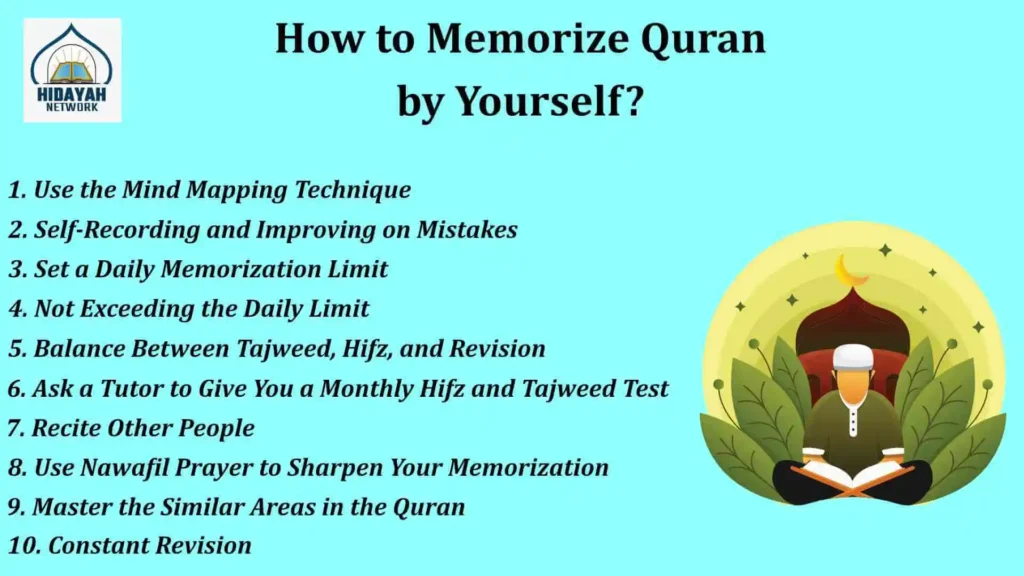Memorizing the Quran by yourself is one of the most exciting yet challenging tasks for any Muslim. If you’re one of those who have taken this responsibility, it’s time you learn about the best techniques to memorize quran by yourself.
You need to set a daily memorization limit, not exceed the daily limit, the balance between Tajweed, Hifz, and revision, using the mind mapping technique, self-recording and improve on your mistakes, and more. We will guide you on how you can implement these techniques into your daily routine and learn the Quran by yourself. Let’s get started!
Table of Contents
Toggle10 Best Tips to Memorize Quran by Yourself
If you want to memorize the Quran by yourself, here are some tips you can follow and learn Quran from home.

1. Use the Mind Mapping Technique
Mind mapping is a powerful visual tool that can aid in Quran memorization. Create a central node with the Surah name and branch out to smaller nodes with the verses’ starting words. For instance, draw connections between related themes, use colors to differentiate sections, and add brief keywords that trigger your memory for each verse. With this method, individuals can memorize Quran surah in one hour easily.
This technique assists in organizing information visually, making it easier to recall verses by seeing their connections and relationships. An example could be to draw a mind map for a specific Surah, using separate branches for different themes or topics covered within it. Highlight the verses relating to mercy, justice, or guidance, for instance, connecting them with arrows and brief annotations to illustrate their significance.
2. Self-Recording and Improving on Mistakes
Recording your recitation and listening to it is a valuable self-assessment tool in Quran memorization. When you record yourself reciting, it’s vital to actively listen for errors or areas needing improvement.
Analyzing these recordings and taking note of the mistakes helps in recognizing patterns or recurring errors. As a practical step, consider using a digital recorder or a smartphone app to capture your recitation. Upon playback, make a checklist of areas to work on, such as Tajweed rules or specific verses that need more attention, and dedicate focused practice to refine those segments. This is one of the best methods no how to memorize quran fast.
Get 40% OFF Now!
3. Set a Daily Memorization Limit

The first thing to do after deciding to memorize the Quran by yourself is to set a daily memorization limit. You must have tested yourself with other memorization before embarking on online Quran memorization, therefore, you must have known what you can memorize daily.
As soon as you hit your daily limit, the next thing is to be repeating the memorization continuously so that it will stick to your brain. For instance, consider starting with half a page or a few verses daily, gradually increasing as you become more comfortable. This approach helps prevent overwhelm and burnout, ensuring consistent progress without straining your capacity.
4. Not Exceeding the Daily Limit
Sticking to the daily limit is very important. It helps in balancing. It discourages laziness and encourages a positive attitude. If your set limit for the day is a page of the Quran, resist the temptation to exceed it, as doing so might compromise the quality of memorization. Staying within the daily limit allows for better comprehension and retention of the verses, ensuring a more focused and effective learning process.
Allah in his wisdom created us differently, what some people can memorize in 30 minutes, it will take some people 24 hours to memorize it.
The most important thing is to know your limit.
5. Balance Between Tajweed, Hifz, and Revision
It is very important to balance these three points. As you are striving in your memorization, you must also pay attention to the rules of tajweed. There is nothing to celebrate when you memorize the Quran but you cannot read it properly.
Allocate specific time for each aspect: focus on learning Tajweed rules to recite accurately, dedicate time for memorization, and consistently revise previously memorized verses.
6. Ask a Tutor to Give You a Monthly Hifz and Tajweed Test
Experience they say is the best teacher. In everything in life, some people have gathered experiences that can’t be bought. In Africa, there is a saying that, he who has never been to another person’s father’s farm will say his father’s farm is the biggest.
Ask your tutor to conduct monthly tests focusing on Hifz (memorization) and Tajweed (proper recitation) to assess your progress. These tests help identify areas needing improvement, provide constructive feedback, and boost motivation, encouraging continual growth and refinement of your recitation skills.
One way to test yourself is to subject yourself to external scrutiny. You can look for An Imam around you and ask him to be scrutinizing you. Let him give you online Hifz classes and Tajweed tests monthly. This will go a long way in determining how far you have improved or how far you are still lagging.
7. Recite Other People
If you have parents or friends who have Quranic knowledge, it is an added advantage when it comes to memorizing the Quran. After Subhi or Ishai prayer, your friends or family members can help you hold the Mushaf while you revise what you have memorized during the day or the previous day.
Regularly reciting to someone else allows you to become more comfortable with your recitation and pronunciation. Feedback from others aids in correcting mistakes, improving confidence, and refining your recitation when memorizing the Quran independently.
8. Use Nawafil Prayer to Sharpen Your Memorization
Solatu Subhi, Solatu Zuhr, Solatul Asr, Solatul Magrib, and Solatul Isha are obligatory prayers in Islam. You might not be able to practice your memorization with these prayers because you have to consider your followers.
In one hadith, Jabir narrates that Muaz ibn Jabal would offer prayers with the Messenger of Allah and then would return to his people and lead them in prayers. One evening, he offered the Isha prayer behind the Messenger of Allah peace be upon him. When he returned to his people, he led them in Isha prayers and began reciting Suratul Baqorah. Upon this, one person separated himself from the congregation, said salam to indicate the end of the prayer, and began to pray on his own. Seeing him do this, the people called out his name and said, ‘’Have you become a hypocrite?’’ They admonished him for leaving the congregational prayer and praying on his own and asked him whether he has become a hypocrite. The man said I will certainly go to the prophet and inform him of what I have done. He said, if I was a hypocrite, I would have offered my prayer secretly.
The man came to the Messenger of Allah and said, we transport water from one place to another on our camels and ensure people have water in their homes. Thus, we work all day long. He said, Muaz offered the Isha prayer with you and cane to his own neighborhood and started reciting Suratul Baqora. The Messenger of Allah called Muaz and said, why do you cause hardship for people? The Messenger of Allah then advised what to recite and repeated it again.
The Messenger said you ought to have recited Suratu Shams, Suratu Duha, Suratu Layl, and Suratul al-Ala.
I quoted this hadith to let you know that there will be a limit to what you can recite during the five daily prayers. As for the Nawafil prayers like Solatu Duha, Qiyamu Layl, Solatul Witr, and others, they are good avenues for you to practice your memorization because there is no limit to what you can recite.
9. Master the Similar Areas in the Quran
The Quran is a book that has many similar verses. Mastering these similar verses is what will make you a certified hafiz.
For example, in Suratul Baqorah verse 58, Allah said, fakulu minha while in verse 161 of Suratul Al-araf, Allah said wakulu minha.
Another example is verse 170 of suratul Baqorah, Allah said ma wajadna alayhi aaabahana while in verse 21 of suratu Luqman, Allah said ma alfayna alayhi aabahana.
So these are some of the similar verses that you have to master in the course of your memorization. There are many more in the Quran. In fact, scholars have written many books explaining similar verses in the Quran.
10. Constant Revision
The Quran is different from other books. It is not a book that you can close for several days and come back to it expecting your Hifz to be sharp as you left it. It is a book that requires you to be going through it every day till you go back to Allah.
Allocate a specific time each day to revise previously memorized verses. Creating a revision schedule ensures that the memorized content remains fresh in your memory, preventing forgetfulness, and building a strong foundation for Quranic recitation.
Golden Techniques of Memorizing the Quran
Utilizing mind-mapping techniques is an invaluable strategy for Quran memorization. By placing the central concept, such as a Surah name, in the center and branching out to its constituent parts, like individual verses or thematic segments, individuals create a visual aid to strengthen recall.
Additionally, the 3×3 method involves breaking down the memorization process into manageable portions. For instance, divide each page into three sections, then focus on memorizing three verses at a time. This method allows for better concentration and understanding of the verses before moving on to the next set, promoting a more focused and effective memorization process.
Moreover, the technique of reading one verse (ayah) multiple times, around 5-10 times, enhances retention. This repetitive reading aids in solidifying the verse in memory and comprehension. It allows for a deeper understanding of the verse’s meaning, along with facilitating its memorization.
Conclusion
It is the amount of effort that you put into something that will guarantee its success. If you have the determination and you apply these 10 quran memorization tips we have listed in the article, you will get a result in no time InshaAllah.
Most Important FAQs
In what order should I memorize Quran?
Start by memorizing shorter chapters (Surahs) first, such as Juz Amma, and then progress to longer chapters. It’s commonly recommended to follow the sequence of the Quran but starting with smaller sections can build confidence and momentum.
How can I memorize Quran without forgetting?
Start by memorizing shorter chapters (Surahs) first, such as Juz Amma, and then progress to longer chapters. It’s commonly recommended to follow the sequence of the Quran but starting with smaller sections can build confidence and momentum.
How much time does it take to memorize Quran?
The duration varies based on individual capabilities, dedication, and time invested. Some may take a few years while others might complete it in a shorter time. On average, with consistent effort, it might take 2-5 years.
How to memorize 2 pages of Quran a day?
Break down the pages into smaller sections, memorize each verse or part separately, and gradually piece them together. Repetition, understanding the meanings, and consistent daily practice can aid in memorizing 2 pages a day.

About Author
Related Blogs
Dive Deeper into Related Topics

